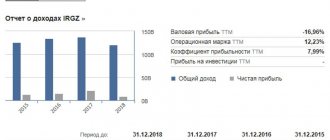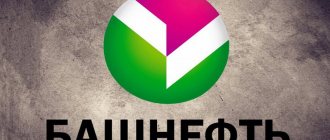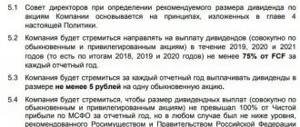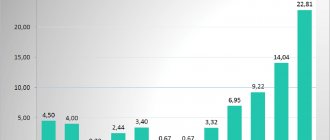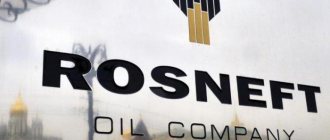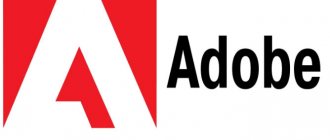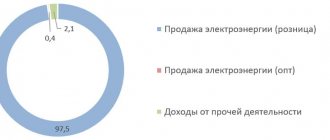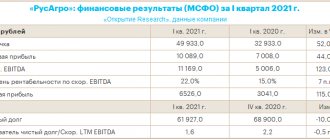| File:Logo-tnk-bp-ru.gif | OJSC TNK-BP Holding Open Joint Stock Company |
Date of foundation: 2003 Location: Moscow (Russia) Key figures: German Khan (executive director), Viktor Vekselberg (executive director for gas business) Industry: Oil production, oil refining Parent company: TNK-BP International Number of employees: approx.
60 thousand people. 60000 people. [1] Turnover: ▼ 524.727 billion roubles. 08 year) $45.128 billion 3299736796000.1 rubles ₽ 3299736796000.1 3451505774.418 Reichsmarks 1650653315 .856 rubles in gold 165985268374.34 kopecks in gold [3] (US GAAP, 2008) Operating profit: ▼ 98.341 billion rubles 98341000000 rubles ₽ 98341000000 98341000 thousand rubles 98341 million rubles 0.0983 trillion rubles [2] (RAS, 2008) $8.061 billion 589416289500, 02 rubles ₽ 589416289500.02 589416289.5 thousand rubles 589416.29 million rubles 589.416 billion rubles [3][4] (US GAAP, 2008) Net profit: ▼ 82.697 billion rubles 82697000000 rubles ₽ 826 97000000 82697000 thousand rubles 82697 million rubles 0.0827 trillion rubles [2] (RAS, 2008) ▼ $6.384 billion 466794888000.01 rubles ₽ 466794888000.01 466794888 thousand rubles 466794.888 million rubles 466.795 billion rubles [3] (US GAAP, 2008) Auditor: CJSC "PricewaterhouseCoopers Audit" (RAS, 2007-2008 years;US GAAP, 2006-2008) CJSC BDO Unicon (RAS, 2006) tnk-bp.ru
Sample: ··
Shape: o s
TNK-BP
(“Te-En-Ka BP”) is one of the largest Russian oil companies (third in Russia in terms of oil production).
Full name: Open Joint Stock Company TNK-BP Holding
. Headquarters is in Moscow. Included in the 2009 Fortune Global 500 list (234th place)[5].
History[edit]
The company was created in 2003 on a parity basis by the British and Russian Tyumen Oil Company (TNK) and registered in the British Virgin Islands. TNK, in turn, was formed on August 9, 1995 by separating oil production assets (Nizhnevartovskneftegaz, Tyumenneftegaz) and the Ryazan Oil Refinery from Rosneft. In 1997 the company was privatized and came under the control of its current co-owners. In 1999, TNK, during the division of SIDANCO's assets, included the Saratov Oil Refinery, Varyeganneftegaz, Udmurtneft, Novosibirskneftegaz and Saratovneftegaz that belonged to it. In 2000, the company acquired ONAKO. The following year, the company bought the bankrupt Lisichansky Oil Refinery in Ukraine. In 2002, TNK, on a parity basis with Sibneft, acquired an oil and gas company, the division of which between the two owners has not yet been completed. TNK-BP owns the oil production association Orenburgneft.
After the formation of the joint venture with BP, the structure of the company’s assets also changed: in 2005-2007, Saratovneftegaz, Udmurtneft, Orsky Oil Refinery, and a share in RUSIA Petroleum were sold.
The role of TNCs
The role of transnational corporations is ambiguous. These are truly huge companies with significant assets, revenues and profits that are many times greater than the GDP of small African states. They account for approximately half of the world's industrial production and about 2/3 of world trade. Many people work there; they can be city-forming enterprises.
The power of transnational corporations is obvious. With so many financial resources and the need to compete with other similar companies, MNCs are the driving force behind technological progress. These firms also often host social events to win over clients.
positive aspects of TNCs can be highlighted :
usually high-quality and affordable products
a large number of secure jobs
innovative activity
social activities
On the other hand, transnational corporations are essentially monopolies. This makes it difficult for other players to enter the market, which negatively affects the end consumer. Smaller firms may not be able to meet existing price or time constraints, even if their product is unique and of high quality.
The state supports TNCs with subsidies, since the economic stability of the country depends on them. In addition, transnational companies, due to the specifics of their structure, can legally bypass existing tax legislation, which greatly reduces their tax burden.
Thus, the negative aspects of TNCs :
restriction of competition
underpayment of taxes
setting your own standards
significant impact on the economies of countries
Owners and management[edit]
The company is a subsidiary of TNK-BP Limited, registered in the British Virgin Islands. TNK-BP Limited was established on August 29, 2003 by a British oil company and a consortium of Alfa Group, Access Industries and Renova[6].
The building on Arbat in Moscow, in which the company's headquarters is located
The founders contributed 96% of the shares of TNK, 98% of the shares of Onako and Sidanko, 50% of Slavneft, shares in RUSIA Petroleum and Rospan. In 2005, shares of TNK, Onako, Sidanko and 14 other holding companies were converted into securities of TNK-BP Holding, registered in the Tyumen region. About 5% of TNK-BP shares are in free float.
The executive director of the company is German Khan, the executive director for gas business is Viktor Vekselberg.
Classification
TNCs are often divided into three large groups:
- Horizontally integrated multinationals operate divisions located in different countries that produce the same or similar products.
- Vertically integrated multinationals operate units in a particular country that produce goods that are supplied to their units in other countries.
- Separate MNCs - manage divisions located in different countries that are not vertically or horizontally integrated.
Activities[edit]
Oil production is carried out in the following regions: Western Siberia (Tyumen and Novosibirsk regions, Khanty-Mansiysk - Samotlor field and Yamalo-Nenets Autonomous Okrug); Volga-Ural region (Orenburg and Saratov regions, Republic of Udmurtia); Eastern Siberia (Irkutsk region); Far East (Sakhalin).
Audited proven hydrocarbon reserves as of December 31, 2008 amounted to 8.230 billion barrels of oil equivalent according to the US Securities and Exchange Commission (SEC)[7].
The company owns 5 oil refineries in Ryazan, Nizhnevartovsk, Nyagan (KhMAO), Saratov and Lisichansk in Ukraine.
The company's retail network includes more than 1,500 gas stations operating under the TNK and BP brands. At the same time, TNK-BP itself and its subsidiaries own only 680 gas stations (including all operating under the BP brand); the rest are owned by independent operators who use the TNK brand under a jobber agreement with TNK-BP.[8]
Performance indicators[edit]
The total number of personnel is approximately 60 thousand people[1]. Hydrocarbon production in 2008 amounted to 601 million barrels of oil equivalent[9].
The company's 2006 financial results were seriously revised in the 2007 financial statements, most likely due to the arrival of a new auditor (PricewaterhouseCoopers instead of BDO Unicon).
Financial indicators of the company according to RAS
| 2006[10] | 2006[11] | 2007[10] | 2008[2] | |
| Revenue, billion rubles | 484,8 | 584,5 | ▼ 400,8 | 524,7 |
| Operating profit, billion rubles. | 91,3 | 61,4 | ▼ 64,1 | 94,3 |
| Net profit, billion rubles. | 119,4 | 119,4 | ▼ 49,4 | 82,7 |
Financial indicators according to US GAAP[6][12][4][3].
| 2006 | 2007 | 2008 | |
| Revenue, billion $ | 32,1 | 34,995 | 45,128 |
| Operating profit, billion $. | 6,2 | 7,255 | 8,061 |
| Net profit, billion $ | 6,4 | ▼ 5,732 | 6,384 |
Rating by level of foreign assets
But we can also look at transnational corporations from the other side. The list of the world's largest companies by level of foreign assets (that is, the share of foreign countries in the company's capital) is as follows:
- General Electric (energy, USA).
- Vodafone Group Plc (telecommunications, UK).
- Royal Dutch/Shell Group (oil and gas sector, Netherlands/UK).
- British Petroleum Company Plc (oil and gas sector, UK).
- ExxonMobil (oil and gas sector, USA).
- Toyota Motor Corporation (automotive industry, Japan).
- Total (oil and gas sector, France).
- Electricite De France (housing and communal services, France).
- Ford Motor Company (automotive industry, USA).
- E.ON AG (housing and communal services, Germany).
Here the situation is slightly different from the ranking of the richest companies: the geography is much broader, and the areas of interest are different.
Conflict between shareholders[edit]
In May 2008, an acute conflict between the Russian shareholders of the company (the Russian consortium AAR: Alfa Group of Mikhail Fridman, Access Industries of Leonard Blavatnik and Renova of Viktor Vekselberg) became public, who insisted on the dismissal of Dudley and a reduction in the number of British managers in companies, on the one hand, and their British partners, on the other[13]. For its part, the Russian consortium AAR believed that British BP was trying to establish control over the holding, ignoring the interests of other shareholders of the company, and therefore it announced the initiation of legal procedures to protect its interests in the holding[14].
On June 12, 2008, the Chairman of the Board of Directors of the company, Peter Sutherland, expressed disappointment at the inaction of the Russian Prime Minister V. Putin due to the fact that, in his opinion, he does not prevent the Russian “oligarchs” from using force in their attempts to take TNK-BP under its complete control, according to reports in The Guardian[15][16][17].
On 6 July 2008, the Sunday Times Business Supplement reported that British Petroleum
filed a lawsuit in the High Court
of Justice
against four Russian shareholders of TNK-BP: Mikhail Fridman, Viktor Vekselberg, Leonard Blavatnik and German Khan[18][19].
On September 4, 2008, the parties to the conflict signed a 5-page memorandum of understanding based on the general agreement between Hayward and Friedman, reached at the end of July in Prague[20]. By making concessions to Russian shareholders in matters of “restructuring management and governance,” BP managed to insist on an IPO of at least 20% of the joint venture and maintaining a 50% stake[20]. In early October 2008, company co-owner Viktor Vekselberg told Russian President Dmitry Medvedev that the conflict in the company had been completely resolved, and the parties had agreed on the resignation of TNK-BP CEO Robert Dudley[21].
The basis of TNK
It is worth noting that TNC (this is how a transnational corporation is abbreviated) is the last stage of international cooperation of legal entities. Before this, the enterprise can be an open partnership or a limited liability company.
Another option is to create cartels - participants jointly regulate production volumes and the process of hiring workers.
The third method of international cooperation is syndicates, which imply coordinated actions in the purchase of raw materials and the sale of goods (from the total purchase of oil, one company can produce gasoline, and another rubber).
The fourth variant of cooperation is a concern where only the management of financial activities is common, while the individuals themselves are constantly engaged in different types of activities (one branch of the company is engaged in sewing sportswear, and the other is engaged in military uniforms).
The closest in its characteristics to a TNC is a trust - companies merge one of the areas of production, having common sales and finances in it (for example, joint production of aircraft engines and the constant production of instruments for aircraft by one side and passenger seats by the other). After the enterprise has experienced at least several similar cooperations, it can expand to the scale of a multinational corporation.
Links[edit]
- tnk-bp.ru
- ↑ a b OJSC TNK-BP Holding. Annual report - 2007
- ↑ a b c d "OJSC TNK-BP Holding". Profit and loss report for January-December 2008 (file Accounts_report_2008.pdf)" (ZIP). Retrieved 07/24/2009. Check date values in: |accessdate= (help)
- ↑ a b c d “TNK-BP Holding - consolidated financial statements for 2008 in English” (PDF). Retrieved 06/24/2009. Unknown parameter |lang= ignored (help); Check date values in: |accessdate= (help)
- ↑ a b Operating profit is obtained as the difference between the company's revenue and cost.
- Fortune Global 500 // money.cnn.com (Accessed July 31, 2009)
- ↑ a b “TNK-BP Holding - consolidated financial statements for 2007” (PDF). Unknown parameter |lang= ignored (help)
- TNK-BP reports the results of an international reserve audit for 2008
- Anatoly Temkin
. Gas stations for the rich. TNK-BP has set its sights on the premium segment // Vedomosti - St. Petersburg, No. 159 (1933), August 27, 2007 - Olga Proskurnina, Irina Malkova
. “There should be one director for everyone,” Maxim Barsky, executive vice president of TNK-BP // Vedomosti, 12/21/2009, 241 (2511) - ↑ a b "OJSC TNK-BP Holding". Profit and loss report for January-December 2007 (file Accounts_report_2007.tif)" (ZIP). Retrieved 07/02/2008. Check date values in: |accessdate= (help)
- “OJSC TNK-BP Holding Accounting Statements for 2006” (PDF). Archived from the original (PDF) on 2007-09-28. Retrieved 07/02/2008). Check date values in: |accessdate= (help)
- OJSC TNK-BP Holding. Annual report - 2006
- TNK-BP split, the company's president, Robert Dudley, became a victim of the conflict NEWSru.com May 27, 2008
- Russian shareholders of TNK-BP are suing British partners NEWSru.com June 12, 2008
- BP ups stakes by accusing Putin of failing to stop hijack by oligarchs by Terry Macalister The Guardian June 13, 2008
- BP considers route out of Russian minefield FT.com June 12, 2008
- BP Chairman of the Board of Directors Peter Sutherland is upset that the Russian leadership does not prevent the “oligarchs” from using “strong tactics” NEWSru.com June 13, 2008
- BP Russian feud moves to UK court. Oil giant sues billionaires in battle to run joint venture, alleging it is owed £180m The Sunday Times July 6, 2008
- The conflict in TNK-BP went to court in London NEWSru.com July 6, 2008
- ↑ a b Strained relations thaw over TNK-BP Financial Times September 5, 2008
- Irina Malkova
. How we made peace // Vedomosti, No. 188 (2210), October 6, 2008
Template:Russian oil companies
Help for traders
Friedman is a businessman to the core: cold, calculating, cynical. Many people who know him note his insight and intelligence. He always emphasized that he was engaged exclusively in private business and avoided, for example, the sphere of government procurement. Friedman, who is not closely associated with state-owned companies and political figures, always speaks of the authorities with respect. And Sechin was an effective deputy prime minister, he made decisions in the interests of the state, very correct decisions, says one of the acquaintances of the Rosneft president. Sechin equated Putin’s will, state security and the public good. After the purchase of TNK-BP, a lot has changed.
In the spring of 2015, Bloomberg, citing sources from among the advisers to the President of Russia, wrote that a crack was emerging in the relationship between Vladimir Putin and Igor Sechin, allegedly due to the huge debts of Rosneft, constant requests for state support and tax breaks, as well as due to the collapse of the exchange rate ruble after the placement of the company's bonds in December 2014. And although there is no real evidence of Sechin’s disgrace, the fact remains that Rosneft has huge debts, and it itself is worth less than it once paid for TNK-BP.
“Company capitalization is an unrepresentative indicator, especially in Russia and especially in the current conditions. It reflects country risks to a greater extent than the state of the company. The company needs to be assessed based on fundamental indicators, emphasizes Rosneft Vice President Mikhail Leontyev. — And these are not only production volumes and reserves, these are also qualitative indicators: production costs, debt burden. "Rosneft has today returned to the level of debt burden that it had before the purchase of TNK-BP." Before the deal, Rosneft's debt to EBITDA ratio was 1.17, and at the end of the third quarter of 2015 (latest data for March) - 1.61 in rubles and 1.27 in dollars. The large foreign currency debt, as the company itself has repeatedly noted, is regularly paid off. This is true, but there are nuances.
Rosneft's net debt at the end of the third quarter of 2015 was $24.5 billion, the total debt was $47.5 billion. This does not take into account pre-export financing - Rosneft does not include it in the total debt. Therefore, the real debt burden is much higher. In the third quarter of 2015, Rosneft showed in its financial report that it received almost 1 trillion rubles from “the world’s largest oil trading companies,” or approximately $16 billion. What are we talking about? It all started with the purchase of TNK-BP.
The world did not have enough money to buy TNK-BP, a former employee of one of the global oil traders sneers. In November 2012 - February 2013, Rosneft borrowed $31 billion from foreign banks and placed Eurobonds for $3 billion. Approximately $10 billion was missing. This money in the form of pre-export financing for Rosneft was provided by the world's largest traders Glencore and Vitol in exchange for supply of 67 million tons of oil over five years: Glencore - 46.9 million tons and Vitol - 20.1 million tons. The seller and buyers did not disclose the value of the contracts, but at prices more than $100 per barrel, such a volume of oil would cost at least $49 billion .
A former employee of one of the trading companies says that traders actually received a significant discount to the market price. Oil deliveries and repayment of pre-export financing are carried out through specially created companies (SPVs) Ros-GIP (Glencore) and Ros-Vit (Vitol) - both companies are included in the rating of the largest buyers of Russian oil (see page 233). It was by structuring the deal to purchase TNK-BP that Rosneft tested a new way of working with traders.
In June 2013, Rosneft entered into a similar contract with Trafigura with an advance payment of $1.5 billion and the supply of 10 million tons of oil over five years. In February 2015, another contract was concluded, the terms of which are unknown, but the supply volume exceeds 15 million tons, and the prepayment allowed Rosneft to pay more than $7 billion as part of debt repayment against the backdrop of US and EU sanctions. Similar agreements were signed with the Chinese China National United Oil Corporation (a subsidiary of CNPC) and Tonner SARL
On September 7, 2015, at a conference in Singapore, Igor Sechin, seeing Jonathan Kollek, the former vice president of TNK-BP and now the head of Trafigura Eurasia, kissed him on both cheeks, in which the Financial Times saw evidence of the deepest ties between the Swiss oil trader and the Kremlin oilman. Of course, because Rosneft is highly dependent on its traders.
Due to falling oil prices, the company is forced to increase supplies under pre-export financing contracts and, as a result, sometimes cancels regular sales tenders. If you violate the terms of pre-export financing, the trader can demand export proceeds from the company. Thus, almost all of Rosneft’s oil has already been contracted and paid for several years in advance, says one industry source. However, another Forbes interviewee would have gone bankrupt long ago, but she works.”
An interesting detail: in November 2015, Alfa Bank acquired a stake ($150 million) in the syndicated loan Ros-GIP and Ros-Vit, which is secured by oil supplies to Rosneft, from a syndicate member, Morgan Stanley.
Did Friedman find a use for the money received for TNK-BP?
Immediately after the sale of TNK-BP, he said that he would invest in those sectors that interested him previously: fuel and energy complex, telecommunications, retail, banking sector. And all of Friedman’s further investment activities showed his interest exclusively in international projects. In June 2013, the investment corporation LetterOne Group, controlled by Alfa Group, announced the creation of L1 Energy to invest in the international oil and gas sector. Herman Khan was appointed chief executive officer of L1 Energy, and the advisory board included ex-head of BP Lord John Brown and head of AAR Stan Polovets.
Already in November 2013, the company announced its interest in the oil and gas assets of the German RWE - Dea company. Only a year and a half later, after struggling with British authorities who were unwilling to approve the deal, Friedman closed the deal to purchase the assets. At the same time, he had to sell shares in fields in the North Sea that are under the jurisdiction of Great Britain. The British government never approved Friedman's work on these projects. Dea, however, still has gas storage capacity in Germany, as well as projects in Norway, Denmark, Algeria, and Libya. In Egypt, after acquiring Dea, Friedman received a joint project with BP (in a ratio of 35% to 65%), but later L1 announced the sale of a stake in this project. Based on Dea, Friedman plans to develop an international oil business: in December 2015, Dea bought E.ON's assets on the Norwegian shelf for $1.6 billion, and also announced plans to operate in Mexico, South America, Iran and Brazil.
Dea L1 spent only a small part of the money received for TNK-BP on the purchase, since it attracted loans. L1 invested about $4.5 billion in the Pamplona funds of Alex Knaster, a former partner of Alfa Group, spent about a billion on the purchase of student dormitories in the UK, and $200 million on the purchase of Uber shares. The rest of the money is managed by a special treasury, the funds are placed on bank deposits and in risk-free securities, said a source close to Alfa.
Violation of antimonopoly legislation[ | ]
In 2008, the Federal Antimonopoly Service of the Russian Federation imposed a fine on TNK-BP (along with Lukoil, Rosneft and Gazprom Neft) for collectively maintaining monopolistically high prices on the wholesale petroleum products market in the amount of 1.1 billion rubles. The company subsequently successfully challenged these sanctions in the courts, but in May 2010, the Presidium of the Supreme Arbitration Court overturned the decisions of the lower courts and refused TNK-BP to challenge the FAS decision. The head of the FAS, Igor Artemyev, compared the case against four oil companies with the historic decision of the US Supreme Court on the division of John Rockefeller's oil empire, Standard Oil.[32]
In February 2012, TNK-BP was again fined by the Federal Antimonopoly Service of the Russian Federation as part of the “third wave” of antimonopoly cases against vertically integrated oil companies (previously, similar fines were imposed on Rosneft, Gazprom Neft, Bashneft and Lukoil ). Fine in the amount of 1.39 billion rubles. was imposed for the fact that [33][34].

